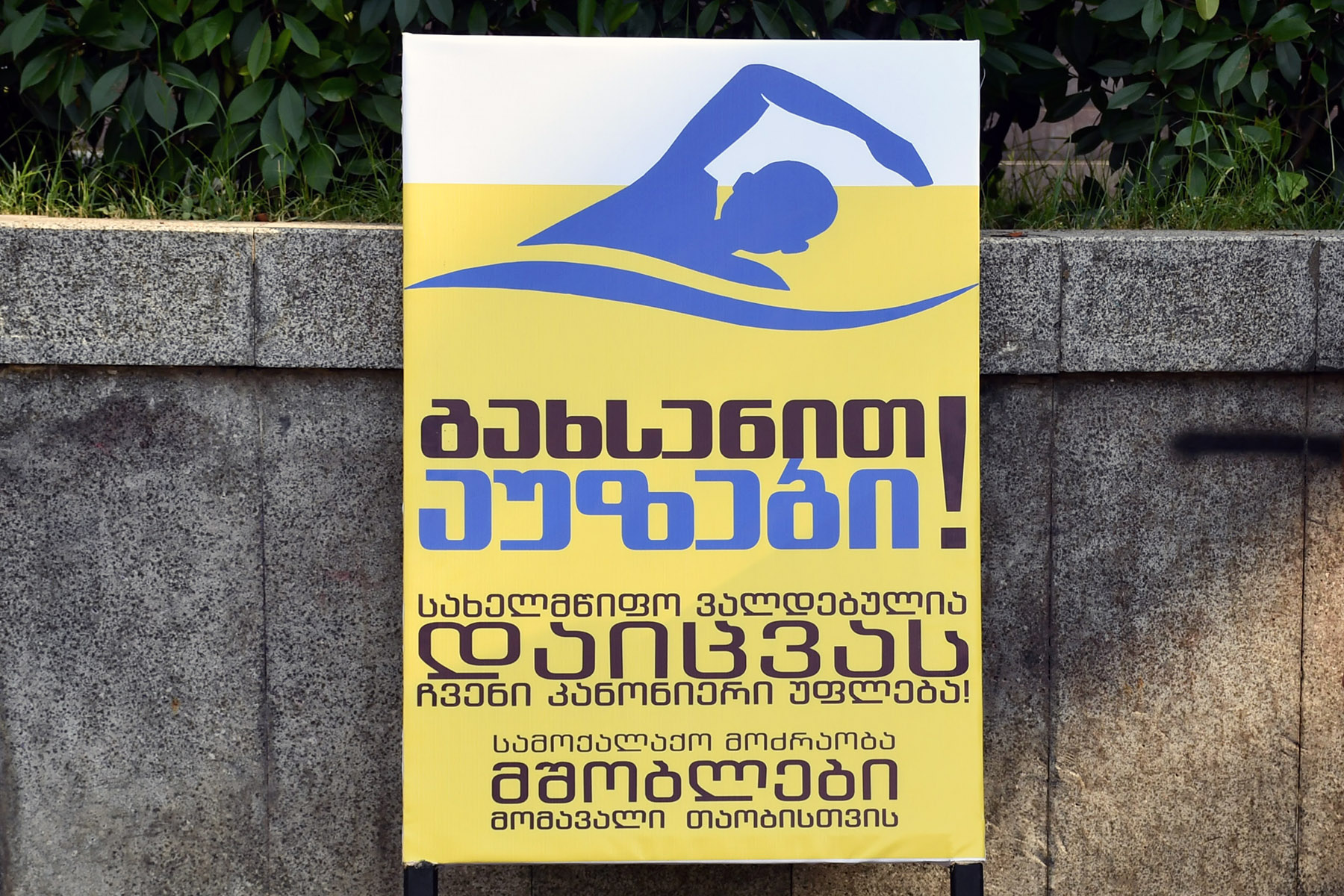
Gym owners, fitness instructors, and gym-goers held a protest on Thursday in central Tbilisi demanding that the government allow fitness centres to reopen.
‘All of us gathered here have been left without income for four months. They’re saying [the virus] is transmitted through sweat but let’s look at what’s happening in buses,’ Giorgi Vasade, a certified personal trainer and one of the organisers of the rally told OC Media.
‘Italy, Spain, Germany — gyms have been opened everywhere while here we have only one or two daily new cases. When is an epidemiological situation suitable for us to open? We demand actual clarifications.’ he said.
While a large part of the economy has reopened since a nationwide state of emergency was declared in March in response to COVID-19, Georgian authorities have kept fitness centres and swimming pools closed.
In the latest decision on 30 June, the government’s anti-COVID-19 Inter-agency Coordination Council announced they were greenlighting exhibitions, training, and conferences in hotels to resume starting from 6 July.
‘I’ve missed the chance to progress in recent months and to make my country proud’, 16-year-old Saba Sajaia, one of the participants of the rally, told OC Media. Sajaia said he was a basketball player who ‘really needed’ to train in the gym.
‘I’m not afraid of a virus… also, there is a risk in restaurants too. Why gyms specifically?’, Sajaia said.
Similar protests were held in Tbilisi on 28 and 9 June.
Georgian Economy Ministry Natia Turnava has said that certain businesses have been kept closed as they present ‘higher risks’ of spreading COVID-19.
According to the Labour Conditions Inspection Department, an agency under the Health Ministry, they are developing safety protocols to allow fitness centres and swimming pools to reopen.
Inspectors from the agency are expected to examine establishments before they are allowed to reopen.
However, the latest specific demands on such establishments remain unclear.
The Georgian Labour Inspection Department and Georgian Business Ombudsman did not respond to a request for more details, while the National Centre for Disease Control declined to comment.
‘No word’ from the government
Giorgi Asatiani, the founder of Tbilisi-based Oktopus Fitness Club, earlier confirmed that one of the points of contention was the government’s requirement to allow no more than one client per 8 square metres in training facilities.
‘We request these 8 square metres be reduced to six, which is an international practice’, Asatiani told Business Media Georgia on 1 July.
According to Oktopus, other requirements considered by the government include clients wearing protective face masks when not exercising and having separate shower cubicles.
Speaking with OC Media, Mikheil Gogoladze, the manager of the Vake Swimming Pool said that they filtered pool water around the clock and were also ready to change 10% of the water every 24 hours, as requested by the government.
However, according to Gogoladze, they ‘have not heard a word’ from the authorities since meeting with them on 23 June where. According to him, officials had promised to share updated instructions as a prerequisite for reopening pools ‘soon’.
Like other swimming and fitness centres, Vake Swimming Pool had to shut down entirely on 18 March after the state of emergency was declared. Several health and fitness establishments closed even earlier in March.

Gogoladze said they had been able to pay their employees up until now but that this would ‘not be possible next month’.
He said the pool, which had 1,300 regular customers, had lost over ₾1.1 million ($360,000) since closing.
‘We choose not to protest for now… We are very concerned and just have questions. They [the government] allowed hotels to reopen in a very quick manner… Perhaps, because there are not a lot of pools in the country like us, they decided to put organisations in service of public health and healthy lifestyle aside’, Gogoladze concluded.
Announcing the government’s six-stage reopening of the economy in late April, Georgian Prime Minister Giorgi Gakharia described the last stage as the ‘most difficult’
The ‘6th stage’ involves rescinding a ban on sports, and reopening recreational, educational, and entertainment establishments. Along with fitness facilities and pools, the authorities so far keep a prohibition on children’s entertainment facilities and casinos.
According to Gakharia, the timing of the 6th stage would depend on ‘the dynamic of the pandemic spread’.











